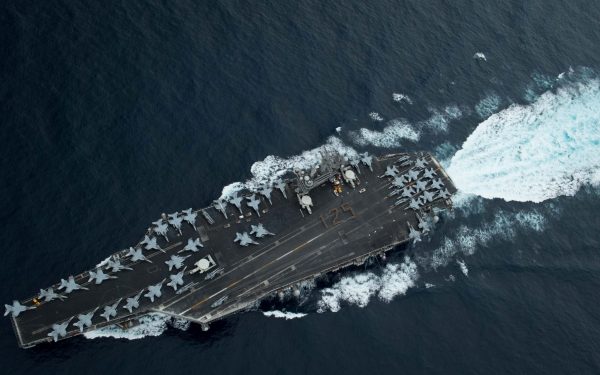India, which traditionally focussed its attention on the Indian Ocean, has now extended its maritime interests from the horn of Africa to the South China Sea. Its influence in the Andaman Sea puts India in a position to project its naval power to the East Asian maritime area (the Pacific side of the Indo-Pacific, specifically the South China Sea). This means there is now a convergence of interests between all four of the Quad members in keeping the large body of water in the Indo-Pacific safe from danger.
Piracy is a major security issue in the Indo-Pacific. Billions of dollars are lost each year through piracy and theft in the Straits of Malacca — one of the top-ranking areas for piracy-related incidents in the world.
Combatting piracy requires large, organised private or public sector operations. Since the early 2000s, private security companies have participated in anti-piracy activities in Somalia and many have been successful in their rescue missions. But this solution is not acceptable to the principal states in the Straits of Malacca — Malaysia and Indonesia — that are opposed to the presence of private security firms escorting merchant shipping through their sovereign waters.
As for public sector operations, the four Quad members have tremendous naval resources that can be used to counter piracy in the Indo-Pacific.
Australia is drawing closer to India in the realm of maritime security, signalled by the two countries’ first bilateral naval exercise in mid-September 2015. The Australian military also participated in the Gulf of Aden anti-piracy operations as part of a security consortium in the western Indian Ocean and overland in Afghanistan. Such exercises are helping Australia to expand its security footprint from the Asia Pacific to the Indo-Pacific.
A spin-off from Australia’s participation in anti-piracy exercises could be exercises to counter illegal immigration. India and Australia have an information-sharing agreement on ‘white shipping’ (the movement of commercial ships), maritime domain awareness (pertaining to anything that threatens the security of a country’s maritime environment) and search and rescue operations. The information shared through this platform helps to stop illegal immigration from the Indian Ocean to Australia — an effort that could be strengthened through joint maritime operations.
The US navy has pivoted back to the Pacific since the Obama era. Due to the reduced incidence of piracy off the coast of Somalia in recent years, the United States has been able to redeploy ships to the Pacific. Its littoral ships stationed in East Asia are potentially formidable weapons against pirates in the Indo-Pacific and their small but speedy skiffs and boats.
The United States also has advanced naval technologies, including drone technologies, that are useful for surveillance. The US African Command used drones for surveillance and intel gathering on pirates for the first time in Somalia in 2009, and the same could be applied in the Malacca Straits.
Anti-piracy operations would enable the Japanese navy to coordinate interoperability with other Quad navies. In one of Japan’s latest naval exercises in March 2018, for instance, the USS Carl Vinson aircraft carrier together with Japanese helicopter destroyer Hyuga conducted drills in the South China Sea. As close allies, the United States and Japan are quite likely to be already inter-operable for anti-piracy operations in the Indo-Pacific region.
The United States also has the potential to pull other partners into anti-piracy exercises and operations in the Indo-Pacific, especially among its traditional allies. In March 2018, a South Korean fishing trawler was attacked by pirates off the coast of Ghana. The occurrence of such incidents provides an incentive for the South Korean anti-piracy unit Cheonghae to work more closely with the United States to combat piracy. The other traditional US ally in the region is the Philippines. The littoral ship the USS Coronado conducted anti-piracy exercises with the Philippine navy in the Sulu Sea in 2017.
But it is perhaps too early in the life of the Quad to be talking about a ‘Quad-plus’. Any further developments will have to depend on complementarity of non-Quad members with Quad options and — more fundamentally — the further institutionalisation of the core alignment of the Quad.
The common interests of India, Japan, Australia and the United States in securing the waters of the Indo-Pacific may provide an incentive for the Quad to more deeply institutionalise. Taking on pirates would also help to achieve the Quad’s purported goal of creating an open and inclusive Indo-Pacific region — something of benefit to all countries with merchant shipping plying the oceans and seas from the horn of Africa to the Pacific Ocean.
Tai Wei Lim is a Senior Lecturer at Singapore University of Social Sciences and an Adjunct Research Fellow at the National University of Singapore’s East Asian Institute.


I do not see what the author advocates cannot, and should not be done in a wider regional cooperation context involving other states rather than having to confine to and give credence to this “quad”.
I dislike the notion of “quad”, on the basis I dislike all exclusive security organizations. You’d think humanity have learned enough lesson over thousands of years that exclusive security organizations puts the situation in the default position of tilting towards suspicion and division. I could write pages on this matter but lets keep it simple: current regional security situation in Asia is tense and divided on couple of fronts but there’s still ample room to reach accommodation and establish an inclusive security for all parties involved. The development of this so called “quad” will be watched closely and should it begin to produce results counterproductive to that goal, it should and will be dismantled.